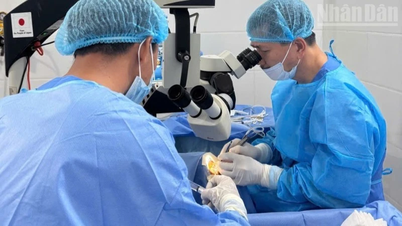Vitamin B12 is an essential micronutrient that plays an important role in converting nutrients into energy, nerve activity and mood regulation. Symptoms of vitamin B12 deficiency are often overlooked because they are easily confused with other health problems, according to the health website Healthline (USA).

Feeling tired all the time could be due to vitamin B12 deficiency.
PHOTO: AI
Vitamin B12 is a water-soluble vitamin, also known as cobalamin. The body does not produce vitamin B12 on its own, so it must be supplemented from natural foods or functional foods. Long-term B12 deficiency can lead to many serious health problems.
Chronic fatigue and weakness are among the most common symptoms of vitamin B12 deficiency. This is because a lack of B12 reduces the ability to make red blood cells.
Red blood cells are responsible for transporting oxygen throughout the body. A decrease in red blood cells will cause the organs to not receive enough oxygen, leading to feelings of fatigue and weakness. In addition, the body will also experience the following symptoms:
Cognitive impairment
In addition to fatigue, people with vitamin B12 deficiency also experience difficulty concentrating, forgetfulness, or a "fuzzy" feeling in the head.
Vitamin B12 deficiency leads to neurological symptoms
Long-term vitamin B12 deficiency can lead to nerve damage. Warning signs of this condition include numbness or tingling in the limbs, muscle weakness, and difficulty maintaining balance.
Pale or yellow skin
Reduced red blood cell count due to B12 deficiency leads to anemia, which is manifested by pale or slightly yellow skin.
Glossitis and mouth ulcers
Tongue inflammation and mouth ulcers are other warning signs of vitamin B12 deficiency. However, not all cases of tongue inflammation or mouth ulcers are due to vitamin B12 deficiency. Other causes may be mouth ulcers, thrush, or allergies.
If a doctor suspects a B12 deficiency, he or she will order a blood test to measure vitamin B12 levels. Depending on the cause and severity of the deficiency, the doctor will prescribe appropriate treatment, such as taking supplements or B12 injections. One of the preferred ways is to increase foods rich in vitamin B12 such as salmon, mackerel, tuna, beef liver, lamb liver, chicken, beef or drinking milk, according to Healthline .
Source: https://thanhnien.vn/cam-thay-kiet-suc-va-de-cau-gat-khi-nao-la-do-thieu-vitamin-185250426190041242.htm
































































































Comment (0)